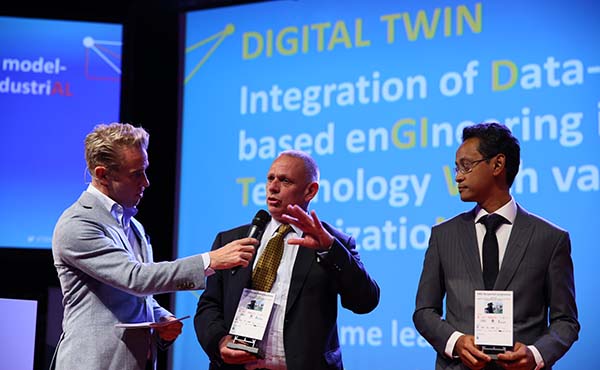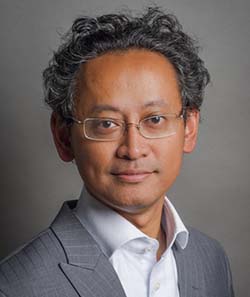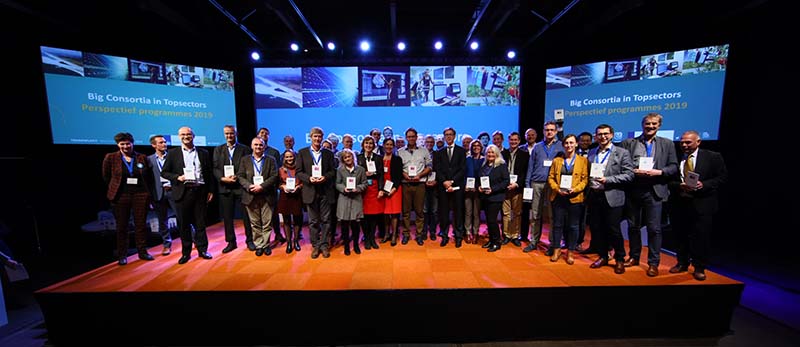NWO awards € 4 million to DIGITAL TWIN programme
Now that the DIGITAL TWIN programme has received a € 4 million grant from the Perspective programme of the Dutch Research Council (NWO), the five-year programme is ready for take-off. Participating companies have added another € 1.6 million to that figure. There are six universities working on the DIGITAL TWIN programme: the UG and the Eindhoven University of Technology, Delft University of Technology, the University of Twente, Leiden University and Tilburg University. They are working together with 12 industrial partners from the high-tech, metal and composites industries, including ASML, VDL Groep, Tata Steel, Philips and Océ. Programme leader Prof. Bayu Jayawardhana (UG – Faculty of Science and Engineering) and co-programme leader Prof. Jan Post (Philips/UG) are now able to appoint 19 researchers.

Smarter system due to digital twin
High-tech systems are becoming increasingly complex and difficult to design, produce and maintain. The DIGITAL TWIN programme develops methods to make accurate digital twins of such systems: virtual software versions, which allow you to run predictive simulations. These simulations can predict, for example, how changes in the design will influence performance or which part is due for maintenance at what time.
DIGITAL TWIN is an acronym and stands for integration of Data-drIven and model-based enGIneering in fuTure industriAL Technology With value chaIn optimizatioN.

At the moment, most digital twins are still based on static theoretical models that assume normal behaviour. By linking these models to measurement data that indicate how the system functions in practice and by combining these data with artificial intelligence, the researchers can make digital copies that continually improve and adapt themselves. The research, led by UG Professor of Mechatronics and Control of Nonlinear Systems Bayu Jayawardhana, focuses on a number of example systems that have been submitted by Dutch high-tech companies involved in the programme. “In this programme, we bring together theoretical mechanical engineering, software engineering, systems and control engineering and artificial intelligence. This results in digital twins that are more accurate, flexible and realistic,” according to Jayawardhana.
Regional embedding
Through two publicly available ‘demonstrators’, the project will make the benefits of the autonomous and flexible development methodology of ‘digital twinning’ available to a wide audience. The project is regionally embedded in northern Field Labs, such as the ‘Region of Smart Factories’.
Every year the Dutch Research Council (NWO) finances four to six Applied and Engineering Sciences Perspective programmes. The Perspective programme is financed by the Ministry of Economic Affairs and Climate Policy. The programme challenges scientists to establish new lines of research with economic and societal impact, in close collaboration with the business world and societal organizations.

More information
- Press release NWO: https://www.nwo.nl/actueel/nieuws/2019/11/van-verticale-landbouw-tot-virtuele-delta-26-miljoen-voor-innovatief-onderzoek.html
- Participants: Airborne, Altran, ASML, ASM PT, Demcon, Fraunhofer Institute for Production Technology, Océ, Philips, University of Groningen, Stamicarbon, Tata Steel, Delft University of Technology, Eindhoven University of Technology, Tilburg University, the Netherlands Organisation for applied scientific research (TNO), Leiden University, University of Twente, VDL Groep
| Last modified: | 25 February 2022 10.20 a.m. |
More news
-
03 April 2025
IMChip and MimeCure in top 10 of the national Academic Startup Competition
Prof. Tamalika Banerjee’s startup IMChip and Prof. Erik Frijlink and Dr. Luke van der Koog’s startup MimeCure have made it into the top 10 of the national Academic Startup Competition.
-
01 April 2025
NSC’s electoral reform plan may have unwanted consequences
The new voting system, proposed by minister Uitermark, could jeopardize the fundamental principle of proportional representation, says Davide Grossi, Professor of Collective Decision Making and Computation at the University of Groningen
-
01 April 2025
'Diversity leads to better science'
In addition to her biological research on ageing, Hannah Dugdale also studies disparities relating to diversity in science. Thanks to the latter, she is one of the two 2024 laureates of the Athena Award, an NWO prize for successful and inspiring...
